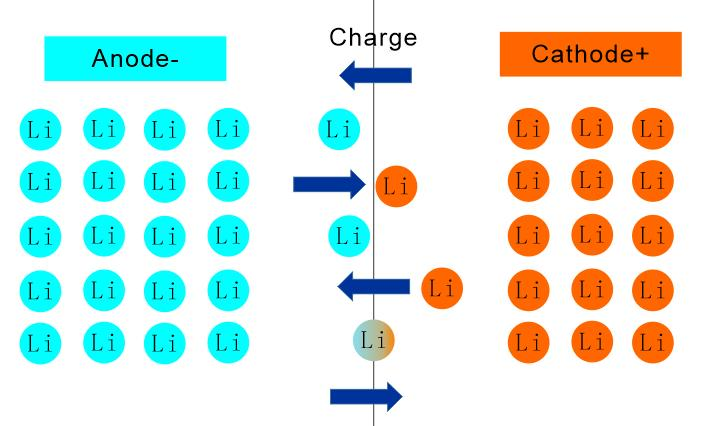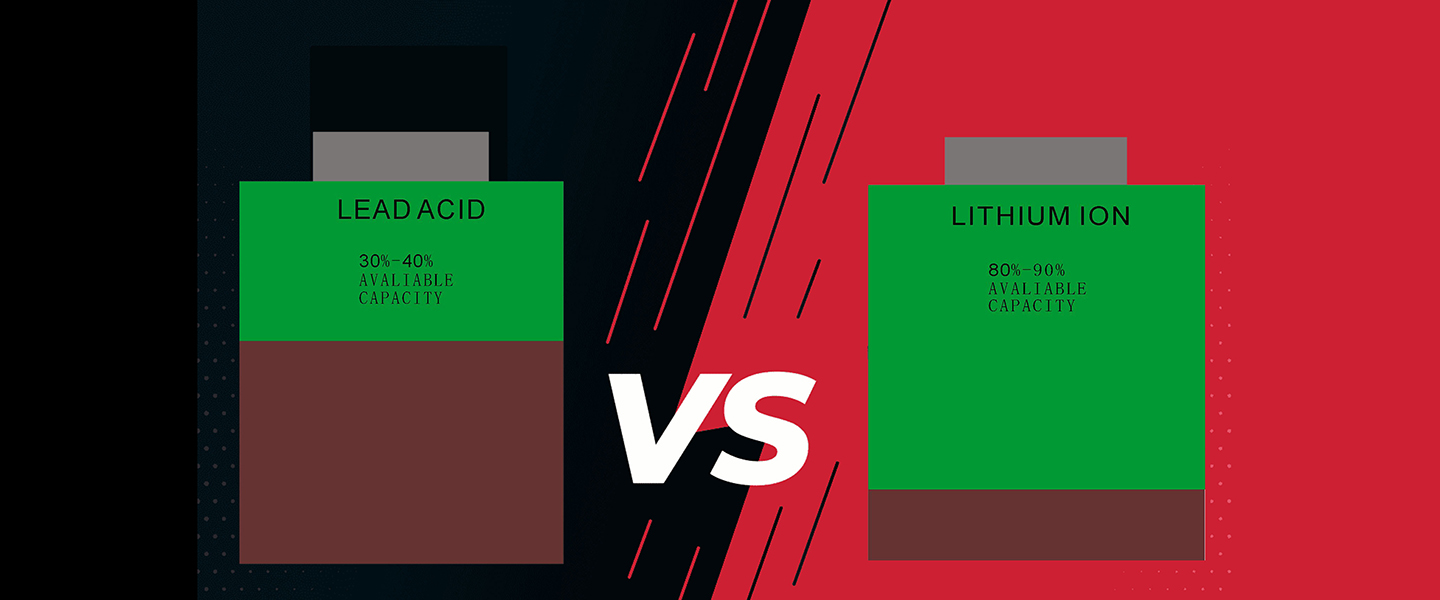How To Choose The Right
First of all, what is a lithium ion battery?
A lithium-ion battery is a rechargeable battery charging and discharging by traveling lithium ions between the positive electrode and the negative electrode. Lithium-ion batteries are categorized into secondary batteries and primary batteries. Disposable batteries cannot be charged repeatedly, but secondary batteries can be charged. Since lithium-ion batteries are appropriate for storing large-capacity electricity, they are widely used in forklifts, RVs, yachts, fishing boats, and other fields. Nevertheless, some soft-packaged lithium batteries are used in electronic goods, smart robots, and other fields.
The working principle of lithium ion battery

Lithium batteries are composed of four key components: an anode, cathode, separator, electrolyte, and two current collectors (positive and negative). The electrolyte is composed of salts, solvents, and additives. It acts as a lithium-ion pipeline between the positive and negative electrodes, bringing positively charged lithium ions from the anode to the cathode and vice versa through the separator. The movement of lithium ions generates free electrons in the anode, thereby generating a charge on the positive electrode current collector. Then, the current flows from the current collector through the device (mobile phone, computer, etc.) that supplies power to the negative current collector. Finally, the separator is a physical barrier that separates the cathode from the anode.
Advantages of lithium-ion batteries
1. High energy density
High power density signifies that lithium batteries can supply more power in the same volume state. For example, compared to 25WH/kg lead-acid batteries and 60-70WH/kg nickel-metal hydride batteries, it can have up to 150 watt-hours (WH) per kilogram (kg).
2. Low maintenance
Since lithium batteries are relatively stable compared to other batteries, they do not require much maintenance under normal circumstances. But when there is an intense collision in an emergency, there will be no fire or explosion.
3. Chargeable
Lithium iron phosphate battery is a secondary battery that can be recharged repeatedly. As a result, users do not have to worry about reinstalling new batteries after use, which provides convenience for those who use them for a long time. However, its disadvantage is that it is more expensive.
4. Long life cycle
Compared with ternary lithium batteries and other lithium batteries, lithium iron phosphate batteries’ cycle times are longer, mostly over 2000 times. Significant cost savings in the long run.
5. Low self-discharge
Lithium iron phosphate batteries’ self-discharge rate is shallow compared with other batteries. So you need not worry that the battery will consume a lot of electricity when not in use.
6. Customizable
Because of different application areas, the battery’s size will vary. Private customization can be made according to customers’ needs.
7. More environmentally friendly
How to judge whether a thing is environmentally friendly can be analyzed from its substances. Lithium-ion batteries do not contain harmful substances, while lead-acid batteries contain lead. Although both batteries are recyclable, lead-acid batteries used in UPS and electric vehicles are much less difficult to recycle than large lithium-ion batteries in most parts of the world. The pollution of lead-acid batteries is mainly reflected in the production process. Lead-containing heavy metal wastewater will appear in painting and battery cleaning.
Although both batteries are recyclable, lead-acid batteries used in UPS and electric vehicles are much less difficult to recycle than large lithium-ion batteries in most parts of the world.
8. Safer
The power lithium battery mainly uses lithium iron phosphate. The PO bond in the lithium iron phosphate crystal is balanced and hard to decompose. Therefore, even with high temperatures case in or overcharge, it will not collapse and heat like vital oxidizing substances or lithium cobalt oxide. According to a report, few samples were found to burn in acupuncture or short-circuit experimentations in actual operation, but no explosion occurred. Lithium iron phosphate batteries thus are safer than other batteries. The lithium iron phosphate battery is equipped with a protection valve. When the air pressure is too high, the protection valve will automatically open to protect the battery. In addition, a BMS protection function is also provided. When the voltage or current is too large, the protection function will be activated.
Types of lithium ion batteries
Parameter
| Items | Lithium titanate | Ternary lithium | Lithium Iron Phosphate |
| Standard Voltage | 2.4V | 3.6V | 3.2V |
| Life style | > 9000 | > 1000 | > 2000 |
| Safer | Good | Better | Excellent |
| range of working temperature | -30-60℃ | -20-55℃ | -20-60℃ |
| Possibility of material price reduction | Have some space | Have some space | Have large space |
| Advantage | Good cycle performance, high stability, fast charging | Good high temperature stability, good resistance to dielectric corrosion | High stability, safety and reliability, good cycle performance, excellent high temperature performance, and can work normally at low temperature -20°C. |
| Disadvantage | The discharge voltage platform is low, the energy density is low, and the price is expensive | The material lattice will be distorted during charging and discharging, and the cycle performance is poor | General conductivity, low tap density |
| Comprehensive price/performance ratio | Low | Generally | High |
Conclusion
Combining all the evaluations, the lithium iron phosphate battery has the highest value. These include a safety factor, stability, and cost performance.
Things to consider before choosing the right lithium-ion battery
1. The power capacity you need
When you want to buy a new battery product, you need to know the power capacity required by the matched item. If the capacity is too large or too small, it will affect the normal operation of the product.
2. Find out the battery size you need
The right size is very important for an application; too large or too small is not suitable. If your application is more special, you need to order a new battery case.
3. Charge rate
The charging rate determines how fast you charge. If you are short of time, then you need a fast charger. If you use it usually, just buy a matching charger. Occasionally fast charging has little effect on the battery. However, frequent fast charging may reduce the battery’s service life.
4. Range of working temperature
When you buy a battery, you need to consider its working environment. Too high or too low the temperature will affect the battery’s regular operation. If the temperature is too low, you may need to heat the battery to a certain level to work correctly.
5. Lifestyle
Since many manufacturers are selling batteries on the market, the prices are also uneven. The number of cycles of different types of batteries is also different. But from the current point of view, the cost performance of lithium iron phosphate batteries is still relatively high. The safety factor is also relatively high.
6. Do you want to use it indoors or outdoors?
For indoor use, you can buy a larger energy storage battery. However, if you use it outdoors, you need to consider whether it is convenient.
7. Which field do you want to apply in?
Lithium batteries can be applied in a lot of fields, for instance, solar and wind power are convertible into electrical energy for storage. It can likewise be used as a portable capability supply, which can be consumed when the emergency capability is required. The same can be consumed in RVs, speedboats, fishing boats, forklifts, and other applications. Different batteries are used in various fields, so you need to think about it before buying.
8. Do you want daily use or emergency?
For daily use, you may need to buy better-quality batteries. For emergency use, you can consider that the purchase price is not that expensive. You can buy it according to your financial capacity.
When you want to buy a new battery product, you need to know the power capacity required by the matched item. If the capacity is too large or too small, it will affect the normal operation of the product.
9. What is the price you are going to spend?
Generally, the higher the price, the better the item’s quality. Therefore, everything should be regarded based on one’s economic strength.
Need help choosing a lithium battery? Please click to get assistance.
Company
Application
Product
Get in Touch

Building 3, Vanke Timemark, 85 Longcheng Ave, Longgang Dist, Shenzhen, China

Get our updates, please contact us through one of the following channels.




